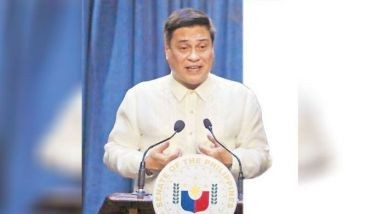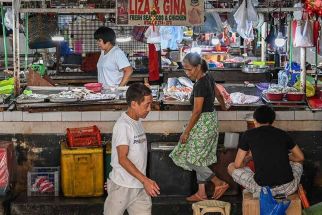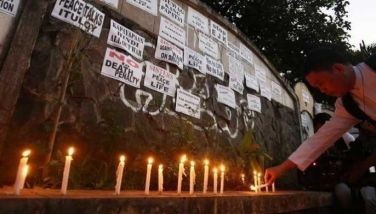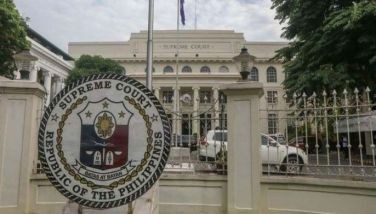US concern prompted RP terror crackdown
April 12, 2004 | 12:00am
The government intensified its crackdown on terrorism following concerns raised by the United States and at least two other countries about fresh threats.
Ronald Post, US Embassy counselor for public affairs, disclosed yesterday that the chiefs of mission of several countries, including Chargé d’Affaires Joseph Mussomeli of the US Embassy, held a series of meetings with President Arroyo and other government officials at Malacañang last March 22.
The New York Times reported yesterday that during the meeting, the US government "quietly warned" Malacañang it had "not been doing enough" to crack down on terrorism.
Post, however, said "warning" was "too strong a word."
"There was a constructive exchange of information, giving new urgency to the situation… new focus for Philippine authorities to move ahead with its anti-terrorism efforts," Post told The STAR. "They provided urgent information and asked the (Philippine) government to act on it."
He also emphasized that in recent days, his government had seen the Arroyo administration "doing some positive action" about the concerns raised at the meeting, and "we’ve been pleased with the positive action."
But he conceded "there’s always more that needs to be done."
In its April 11 edition, The New York Times reported: "The diplomatic reproach, which has not been made public, was delivered to President Gloria Macapagal Arroyo at a late-night meeting nearly three weeks ago and comes after two years of public praise from Washington for her support in the Bush administration’s campaign against terrorism."
The newspaper added: "The warning the Americans delivered to the Philippines is similar to the one they delivered to the Indonesian government weeks before the attacks in Bali in October 2002."
"The Philippine government has been ‘in a state of denial’ about the terrorist threat, said a Western diplomat, explaining what prompted the American warning, which was made on March 22. The United States was joined by Australia and Britain in the warning, diplomats and Philippine officials said," the Times reported.
On March 22 Malacañang announced the creation of a national anti-terrorism task force headed by former defense secretary Eduardo Ermita.
Ermita said yesterday he had not heard of the March 22 meeting or the American warning about the government’s weak counterterrorism efforts.
"We don’t need other people to tell us what to do," he said in an interview.
The government, however, apparently acted on the warning. Days after the meeting, law enforcers conducted raids in Quezon City and Makati, apprehending six men tagged as members of the Abu Sayyaf and seizing 36 kilos of explosives.
President Arroyo announced that the arrests prevented the staging of a "Madrid-level" terrorist attack in Metro Manila — referring to the March 11 train bombings in Spain that killed nearly 200 people.
Washington is seeking the extradition of one of the six suspects, Alhamser Manatad Limbong, alias Kosovo, tagged as the man who beheaded American hostage Guillermo Sobero in June 2001.
On March 31, four Turks teaching Arabic in Cotabato City were detained by immigration officers on suspicion that they were linked to the Jemaah Islamiyah terrorist group. The arrests triggered mass protests in the local Muslim community.
Last Thursday, one of the top Abu Sayyaf members wanted by the United States for the kidnapping and murder of Americans was gunned down by the military in Basilan. Hamsiraji Sali was killed together with four of his henchmen.
The counterterrorism effort suffered yet another setback, however, after 53 inmates at the Basilan provincial jail, including an undetermined number of Abu Sayyaf members, escaped Saturday.
Washington was reportedly exasperated over Manila’s failure to act on intelligence information provided by the Americans regarding the whereabouts of Abu Sayyaf chieftain Khaddafy Janjalani.
On April 5, Ermita announced that Janjalani as well as about 30 Jemaah Islamiyah members were being harbored by a renegade faction of the separatist Moro Islamic Liberation Front.
The New York Times, quoting a Western diplomat, reported that Manila’s "utter refusal" to allow US bomb experts to help determine the cause of the fire on the SuperFerry 14 was another reason for the US warning.
One of the six Abu Sayyaf suspects arrested last month claimed planting a bomb that set off the fire, which left more than a hundred people dead or missing.
The United States reportedly offered to help determine the cause of the disaster, but Manila has ruled out a terrorist attack and refused US help. — With Marvin Sy
Ronald Post, US Embassy counselor for public affairs, disclosed yesterday that the chiefs of mission of several countries, including Chargé d’Affaires Joseph Mussomeli of the US Embassy, held a series of meetings with President Arroyo and other government officials at Malacañang last March 22.
The New York Times reported yesterday that during the meeting, the US government "quietly warned" Malacañang it had "not been doing enough" to crack down on terrorism.
Post, however, said "warning" was "too strong a word."
"There was a constructive exchange of information, giving new urgency to the situation… new focus for Philippine authorities to move ahead with its anti-terrorism efforts," Post told The STAR. "They provided urgent information and asked the (Philippine) government to act on it."
He also emphasized that in recent days, his government had seen the Arroyo administration "doing some positive action" about the concerns raised at the meeting, and "we’ve been pleased with the positive action."
But he conceded "there’s always more that needs to be done."
In its April 11 edition, The New York Times reported: "The diplomatic reproach, which has not been made public, was delivered to President Gloria Macapagal Arroyo at a late-night meeting nearly three weeks ago and comes after two years of public praise from Washington for her support in the Bush administration’s campaign against terrorism."
The newspaper added: "The warning the Americans delivered to the Philippines is similar to the one they delivered to the Indonesian government weeks before the attacks in Bali in October 2002."
"The Philippine government has been ‘in a state of denial’ about the terrorist threat, said a Western diplomat, explaining what prompted the American warning, which was made on March 22. The United States was joined by Australia and Britain in the warning, diplomats and Philippine officials said," the Times reported.
On March 22 Malacañang announced the creation of a national anti-terrorism task force headed by former defense secretary Eduardo Ermita.
Ermita said yesterday he had not heard of the March 22 meeting or the American warning about the government’s weak counterterrorism efforts.
"We don’t need other people to tell us what to do," he said in an interview.
The government, however, apparently acted on the warning. Days after the meeting, law enforcers conducted raids in Quezon City and Makati, apprehending six men tagged as members of the Abu Sayyaf and seizing 36 kilos of explosives.
President Arroyo announced that the arrests prevented the staging of a "Madrid-level" terrorist attack in Metro Manila — referring to the March 11 train bombings in Spain that killed nearly 200 people.
Washington is seeking the extradition of one of the six suspects, Alhamser Manatad Limbong, alias Kosovo, tagged as the man who beheaded American hostage Guillermo Sobero in June 2001.
On March 31, four Turks teaching Arabic in Cotabato City were detained by immigration officers on suspicion that they were linked to the Jemaah Islamiyah terrorist group. The arrests triggered mass protests in the local Muslim community.
Last Thursday, one of the top Abu Sayyaf members wanted by the United States for the kidnapping and murder of Americans was gunned down by the military in Basilan. Hamsiraji Sali was killed together with four of his henchmen.
The counterterrorism effort suffered yet another setback, however, after 53 inmates at the Basilan provincial jail, including an undetermined number of Abu Sayyaf members, escaped Saturday.
Washington was reportedly exasperated over Manila’s failure to act on intelligence information provided by the Americans regarding the whereabouts of Abu Sayyaf chieftain Khaddafy Janjalani.
On April 5, Ermita announced that Janjalani as well as about 30 Jemaah Islamiyah members were being harbored by a renegade faction of the separatist Moro Islamic Liberation Front.
The New York Times, quoting a Western diplomat, reported that Manila’s "utter refusal" to allow US bomb experts to help determine the cause of the fire on the SuperFerry 14 was another reason for the US warning.
One of the six Abu Sayyaf suspects arrested last month claimed planting a bomb that set off the fire, which left more than a hundred people dead or missing.
The United States reportedly offered to help determine the cause of the disaster, but Manila has ruled out a terrorist attack and refused US help. — With Marvin Sy
BrandSpace Articles
<
>
- Latest
- Trending
Trending
Latest
Trending
Latest
Recommended
































